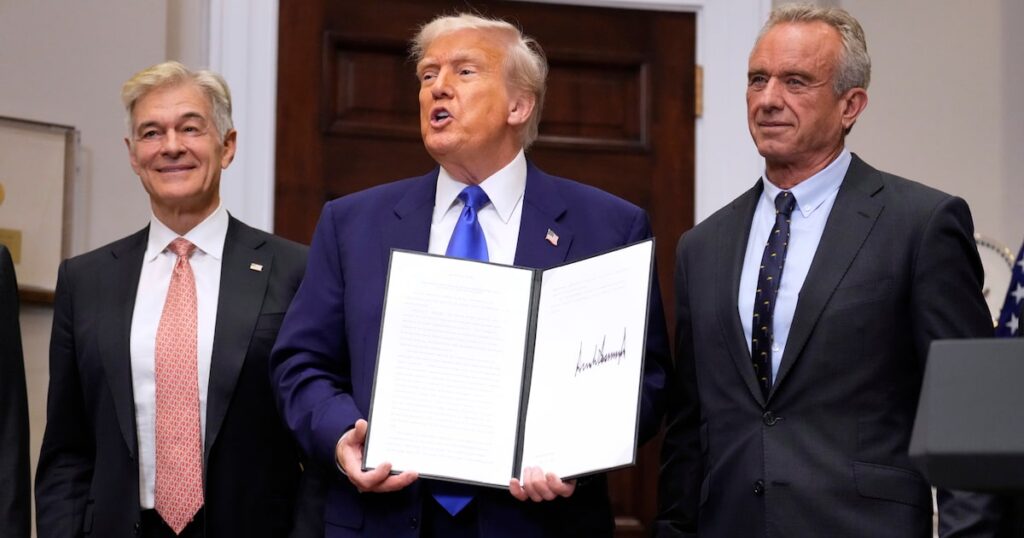WASHINGTON — President Donald Trump on Monday set a 30-day deadline for drugmakers to lower the cost of prescription drugs in the U.S. or face new limits over what the government will pay.
He signed an executive order that calls on the health department, led by Robert F. Kennedy Jr., to broker new price tags for drugs. If a deal is not reached, a new rule will kick in that will tie the price of what the U.S. pays for medications to lower prices paid by other countries.
“We’re going to equalize,” Trump said during a Monday morning news conference. “We’re all going to pay the same. We’re going to pay what Europe pays.”
It’s unclear what — if any — impact the Republican president’s executive order will have on millions of Americans who have private health insurance. The federal government has the most power to shape the price it pays for drugs covered by Medicare and Medicaid.
Taxpayers spends hundreds of billions of dollars on prescription drugs, injectables, transfusions and other medications every year through Medicare, which covers nearly 70 million older Americans. Medicaid, which provides nearly-free health care for almost 80 million poor and disabled people in the U.S. also spends tens of billions of dollars each year for drugs.
The nation’s pharmaceutical lobby, which represents the top U.S. drugmakers, immediately pushed back against Trump’s order, calling it a “bad deal” for American patients. Drugmakers have long argued that any threats to their profits could impact the research they do to develop new drugs.
“Importing foreign prices from socialist countries would be a bad deal for American patients and workers,” Stephen J. Ubl, the president and CEO of PhRMA, said in a statement. “It would mean less treatments and cures and would jeopardize the hundreds of billions our member companies are planning to invest in America.”
Related:Republicans unveil Medicaid cuts; Democrats warn millions will be without health care
Trump’s “most favored nation” approach to Medicare drug pricing has been controversial since he tried to implement it during his first term. He signed a similar executive order in the final weeks of his first presidency. It called for the U.S. to pay a lower price than other countries for some drugs — injectables or cancer drugs given through infusions — administered in a doctor’s office.
That narrow executive order faced hurdles, with a court order blocking the rule from going into effect under President Joe Biden’s administration. The pharmaceutical industry argued that Trump’s 2020 attempt would give foreign governments the “upper hand” in deciding the value of medicines in the U.S.
Trump repeatedly defended pharmaceutical companies, instead blaming other countries for the high price Americans pay for drugs, during a wide-ranging speech at the White House on Monday. The president was flanked by Kennedy, Centers for Medicare and Medicaid Services administrator Dr. Mehmet Oz, Food and Drug Administration commissioner Dr. Marty Makary and National Institutes of Health director Jay Bhattacharya.
Related:Ozempic, Wegovy are among 15 drugs selected for Medicare’s price negotiations
He did, however, threaten the companies with federal investigations into their practices and opening up the U.S. drug market to bring in more imported medications from other countries.
“The pharmaceutical companies make most of their profits from America,” Trump said. “That’s not a good thing.”
The White House did not release an analysis of how much money his order would save or which drugs would be impacted.
The health department’s top leaders will be meeting with drug company executives over the next 30 days to offer new prices on drugs that are based off what other countries pay, Oz said on Monday.
Americans are unlikely to see immediate savings
Americans are unlikely to see relief on rising drug costs quickly because of the order, said Rachel Sachs, a health law expert at Washington University.
“It really does seem the plan is to ask manufacturers to voluntarily lower their prices to some point, which is not known,” Sachs said. “If they do not lower their prices to the desired point, HHS shall take other actions with a very long timeline, some of which could potentially, years in the future, lower drug prices.”
Related:Republican tax and health plan: What it might mean for Americans
The health department has the most authority to change the prices of drugs covered by Medicare and Medicaid because it can set regulations. Even still, the agency’s power to do so is limited. Congress approved in 2022 a law that allows Medicare to negotiate the price it pays for a handful of prescription drugs starting in 2026. Prior to the law, Medicare paid what the drug companies charged. Drug companies unsuccessfully sued over the implementation of the law.
The price that millions of Americans covered by private insurance pay for drugs is even harder for the agency to manipulate.
The U.S. routinely outspends other nations on drug prices, compared with other large and wealthy countries, a problem that has long drawn the ire of both major political parties, but a lasting fix has never cleared Congress.
By AMANDA SEITZ and SEUNG MIN KIM, The Associated Press
Associated Press writer Will Weissert contributed to this report.


